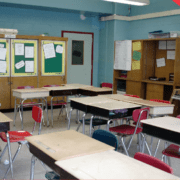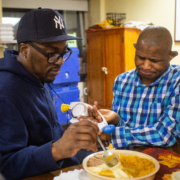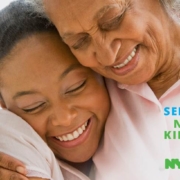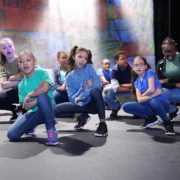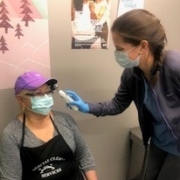Hypebae reports on the proliferation of accessible PPE that allows the Deaf and Hard of Hearing community to better communicate. “We jointly designed a clear face covering to ‘unmask’ masked communication with the deaf and hard of hearing community,” Goldstein said. Sprayground, another brand expanding into the clear face mask category, makes an entirely transparent version featuring two valves, one on each side of the face, that single-use filters can be inserted into. Founder David Ben David shared that the brand has partnered with The New York Foundling’s Family Services for Deaf Children program and will donate masks for distribution in the New York City area.
The Foundling’s President and CEO, Bill Baccaglini, spoke at City and State’s Virtual Healthy New York Summit. The virtual conference, which focused on COVID-19’s impact on New York healthcare policies, brought together decisionmakers and experts from all sectors to identify challenges posed by the pandemic and propose solutions to improve health outcomes for New Yorkers.
Appearing on the event’s “Addressing Health and New York’s Most Vulnerable Populations” panel, Bill Baccaglini addressed the impacts of COVID-19 on the communities we serve. “We can’t go back to business as usual… we learned that tech can be our friend here if we use it wisely. This is not an either or, this is an integration. The mental health issues emanating from this pandemic in disinvested communities will be with us for years to come.” He also advocated for the continued use of tele-health, which has seen positive results in the past few months. “I think if we stick to the traditional clinic-based approach, we’re going to miss something big,” he stated.
Watch the full video below (the panel featuring Bill Baccaglini starts at 1:58:45):
Learn more about the Virtual Healthy New York Summit at City & State here.
The New York Foundling and the National Initiative to End Corporal Punishment proudly presents:
Preventing Abuse and Neglect in Our Lifetime: A Virtual Conference
Thursday, October 15, 2020 and Friday, October 16, 2020
Co-sponsored by:
American Professional Society on the Abuse of Children
US Alliance to End the Hitting of Children
Academy on Violence and Abuse
Prevent Child Abuse America
Stop Spanking
Keynote Speakers
Joan Durrant, Ph.D.
Child-Clinical Psychologist and Professor of Community Health Sciences, University of Manitoba
“The Global Movement to End Corporal Punishment of Children”
David Finkelhor, Ph.D.
Director, Crimes against Children Research Center; Co-Director, Family Research
Laboratory; Professor of Sociology, University of New Hampshire
“The End of Spanking in Historical and Sociological Context”
David Hansell, JD.
Commissioner, NYC Administration for Children’s Services
“Supporting Children and Families Now and in the Future: Lessons from COVID-19”
Melissa Merrick, Ph.D.
CEO, Prevent Child Abuse America
“The Power of Prevention”
Pricing and Registration
Pricing
General Admission:
Day One (October 15, 2020): $25.00 | Day Two (October 16, 2020): $25.00
Both Days: $50.00
American Professional Society on the Abuse of Children members: You will receive your discount automatically when registering.
Day One (October 15, 2020): $15.00 | Day Two (October 16, 2020): $15.00
Both Days: $30.00
US Alliance to End the Hitting of Children, and Academy on Violence and Abuse members: Please email FontanaCenter@nyfoundling.org to request your discount code.
Day One (October 15, 2020): $15.00 | Day Two (October 16, 2020): $15.00
Both Days: $30.00
New York Foundling Staff: The event is free for Foundling staff. Please email FontanaCenter@nyfoundling.org to request your entry code.
Registration:
Please click on the links provided to register:
Day 1 Only | Day 2 Only | Day 1 and 2
Once you have registered, you will receive an email with a link to your event portal which contains all the appropriate zoom links.
For questions, please email FontanaCenter@nyfoundling.org
Event Program
Day One: October 15, 2020
All times are in Eastern Standard Time
10:00am – 10:10am
Welcome: Viola Vaughan-Eden, Ph.D., MJ.; Professor and Ph.D. Director, The Ethelyn R. Strong School of Social Work, Norfolk State University
10:10am – 11:00am
Keynote Speakers:
Joan Durrant, Ph.D.; Child-Clinical Psychologist and Professor of Community Health Sciences, University of Manitoba
“The Global Movement to End Corporal Punishment of Children”
David Finkelhor, Ph.D.; Director, Crimes against Children Research Center; Co-Director, Family Research Laboratory; Professor of Sociology, University of New Hampshire
“The End of Spanking in Historical and Sociological Context”
11:00am – 12:00pm
Workshop: “Recent Research Trends and Topics”
Presenters: George Holden, Ph.D.; Professor and Chair of the Psychology Department at Southern Methodist University
Elizabeth Gershoff, Ph.D.; Amy Johnson McLaughlin Centennial Professor, University of Texas at Austin
12:00pm – 1:00pm: Lunch
1:00pm – 2:00pm
Workshop: “Spare the Rod: The Intersectionality of Race, Religion, and the Raising of America’s Children”
Presenters: Victor Vieth, JD, MA.; Director of Education and Research, Zero Abuse Project
Darrell Armstrong, DDiv, MDiv, EdS-MFT.; Pastor, Shiloh Baptist Church
2:00pm – 3:00pm
Workshop: “Let’s Talk about Race, Culture, Corporal Punishment and Child Abuse Prevention”
Presenter: Stacey Patton, Ph.D.; Research Associate Professor, Institute for Urban Research, Morgan State University
3:00pm – 3:15pm: Break
3:15pm – 4:15pm
Workshop: “No Hit Zones: A Promising Solution to Ending Corporal Punishment”
Presenter: Stacie LeBlanc, MEd, JD.; CEO, The UP Institute; President, American Professional Society on the Abuse of Children No Hit Zone National Committee
4:15pm – 4:30pm:
Closing Remarks: George W. Holden, Ph.D.; Professor and Chair of the Psychology Department, Southern Methodist University
Day Two: October 16, 2020
All times are in Eastern Standard Time
9:00am – 9:15am
Welcome: Bill Baccaglini, CEO and President, The New York Foundling
9:15am – 10:15am
Keynote Speaker:
Melissa Merrick, Ph.D.; CEO, Prevent Child Abuse America
“The Power of Prevention”
10:15am – 10:30am: Break
10:30am – 11:30pm
Workshops: Separate links will be given for the individual workshops once you have registered. Each workshop has limited capacity. You can enter another workshop if your first choice is full.
A. What’s New in Child Sexual Abuse Prevention and How to Make it Work for You
From Erin’s Law to Sex-Wise Parenting, innovations in child sexual abuse prevention policy and practice are available to help keep children safer. This workshop will review current innovations in policy and practice, and end with a focus on how professionals in child welfare and protection can support parents to promote sexual health and safety in their homes and community.
Presenter: Janet Rosenzweig, Ph.D.; Author, The Sex-Wise Parent; Executive Director, American Professional Society on the Abuse of Children
B. Preventing Child Maltreatment in New York State
This session will provide an examination of prevention efforts in New York State. The workshop will focus on the primary prevention of child sexual abuse, corporal punishment and neglect. The role of ACES and resilience in preventing child maltreatment and toxic stress will be discussed. Presenter: Timothy Hathaway; Executive Director, Prevent Child Abuse New York
C. Prevention of Psychological Maltreatment
Psychological maltreatment/emotional abuse is the least understood and most pervasive form of child maltreatment. This workshop will enable participants to define the term and will describe the FAIR system, an approach to assessment allegations and substantiation determinations that is now in use across the U.S. armed services. Our research has found that this approach to assessment and substantiation results in significant declines in subsequent maltreatment as compared with typical approaches. The implications for child welfare systems and families will be explored. Presenter: Amy Slep, Ph.D.; Professor, New York University
11:30pm – 12:30pm: Lunch
12:30pm – 1:30pm
Keynote Speaker:
“Supporting Children & Families Now and in the Future: Lessons from COVID-19”
David A. Hansell, JD.; Commissioner, NYC Administration for Children’s Services
1:30pm – 1:45pm: Break
1:45pm – 2:45pm
Workshops: Separate links will be given for the individual workshops once you have registered. Each workshop has limited capacity. You can enter another workshop if your first choice is full.
A. Effective Program Models for the Prevention of Child Maltreatment
This workshop will highlight effective program models for the prevention of child maltreatment. There are quite a few prevention methods useful to effectively address and mitigate various types of child maltreatment. We will review the risk factors, the absence of which could be considered protective factors. Examples of highlighted models are home visiting interventions, parent education programs, school and child-care based interventions, and community level interventions. Finally, there will be a discussion regarding barriers to child maltreatment prevention programming in the context of historically oppressive systems.
Presenter: Darcey Merritt, Ph.D.; Assistant Professor, New York University
B. Work in The Education and Child Welfare Intersection
Jessica Nauiokas is the co-founder and head of school at Mott Haven Academy Charter School. She will be discussing lessons learned from the first-of-its-kind charter school for child welfare-involved children and youth in grades Pre-K – 8. Haven Academy is a public charter school that utilizes a specialized trauma-sensitive curriculum to help close the achievement gap for children in foster care and the child welfare system, some of whom have been victims of trauma, abuse, or neglect. The revolutionary school will be discussed in depth during this workshop.
Presenter: Jessica Nauiokas, B.S.W., M.Ed.; Principal, Mott Haven Academy Charter School
C. Professionalizing Roles to Prevent Abuse & Neglect for People with Developmental Disabilities
This workshop will examine important career pathways and stepping stones in professionalizing the role of Direct Support Professionals (DSP), to prevent abuse and neglect. We will explore Core Competencies and access to educational opportunities, which will also increase retention. By offering access to information and education in an enjoyable and engaging way for DSPs and other professionals supporting people with developmental disabilities, DSPs can obtain the necessary prerequisite skills to provide support to people in the way they choose to be supported.
Presenters: Renee Pili; Assistant Vice President, DD Division, The New York Foundling MaryBeth Witkop; Assistant Vice President, DD Division, The New York Foundling
3:00pm-3:30pm
Closing Session: Haven Kids Rock Video and Q&A
Haven Kids Rock is a music program that was created for at-risk kids in the New York City child welfare and foster care systems. Rock guitarist Jimi K. Bones and musician and casting director Nefertiti Jones founded Haven Kids Rock in 2008 to provide children with a creative/enriching/therapeutic outlet. The weekly music program resides within Mott Haven Academy Charter School in the South Bronx and shares a close partnership with The New York Foundling.
The New School’s Center for New York City Affairs reports on the lack of mental health resources available to New York City students this school year, including insight from our CEO, Bill Baccaglini.
“As kids finally resume classes – remotely this week and in classrooms next – they will find that many social workers and other mental health care providers have disappeared from school budgets.
“We’re turning off the spigot to kids with serious needs,” says Bill Baccaglini, the executive director of the nonprofit New York Foundling, which runs mental health programs in 22 public elementary, middle, and high schools, mostly in Upper Manhattan and the Bronx.”
By Renee Pili, AVP, Developmental Disabilities Division
| Direct Support Professionals Week is September 13-September 19. To meet some of our DSPs, make sure to follow us on social media. You can find us on Facebook, Twitter, Instagram, and LinkedIn. |
The New York Foundling’s Developmental Disabilities programming has doubled in size in recent years. This growth makes me proud to work at The Foundling and shows just how powerful and committed our organization is to fulfilling needs across the community. Today, we provide Residential Housing, Community Habilitation, Day Habilitation, Employment Services, Nutritional Services, and Clinical Services to 1,000 men and women across New York City and surrounding counties.
We wouldn’t be able to do this work without our incredible team of Direct Support Professionals (DSPs) who help our program participants achieve the highest quality of life possible. Bringing love and compassion to their jobs every day, Foundling DSPs have brightened the lives of the people we serve during a year that has posed enormous challenges.
The essential and critical role our DSPs play in shaping the lives of the people we serve cannot be overstated. They do so much more than what’s in their job description. They connect with program participants on a personal level as they would with members of their own family. DSPs at The Foundling show up early and stay late. They will run to the pharmacy in the middle of the night – or drive hundreds of miles to help facilitate a family visit in another state.
In previous years, Foundling DSPs traveled with residents on vacations. One group flew to West Palm Beach, Florida for a week! Many of them had never flown on a plane before, been to the beach, experienced nightlife, or stayed in a resort. Another group of residents spent over a month and a half in a house on Lake George while their residential home was renovated, and their DSPs took two-week shifts to make it happen. The group got to enjoy the walkable lake town, watersports, mini golf, arcades, and steamboat rides. Our residents were able to have these wonderful experiences because of their DSPs’ willingness to be with them.
Most of our staff work full-time and meet with our program participants four to five days a week. Each person in our care has different needs and abilities, so our team is trained to provide a wide range of supports. Some people need 24-hour care—assistance eating, bathing, and dressing. Others may need help cooking a healthy meal, doing laundry, or maintaining friendships and relationships with others. For those seeking employment, DSPs will take them to job interviews and work with them on resume building, workplace etiquette, meeting deadlines, and travel training.
This year, when the pandemic hit, our team of DSPs educated all 1,000 program participants in mask wearing and social distancing—it has since become an ingrained part of their day-to-day routine. Many worked overtime to cover shifts when colleagues got sick—some working round the clock. A few DSPs even volunteered to transfer to a residence where residents and staff member tested positive for COVID-19, because they needed help. And staff did everything they could to keep morale up. One house manager slept at one of his rental apartments so he wouldn’t potentially infect his wife, son, and mother-in-law.
With all the time they spend together, with everything they’ve experienced this year, our Direct Support Professionals really have become like family to the men and women who call The Foundling home. For some, the DSPs are the only family and friends they have. Ironically, it’s when a person becomes less and less reliant on a DSP over time that we know we are achieving success.
Our DSPs have shown again and again that they will do whatever it takes to give the individuals in our care happy, healthy, well-rounded lives. Their generosity and their commitment know no bounds. And I am proud to call them my colleagues, now more than ever.
Washington Examiner reports on how the COVID-19 pandemic has led to decreased reports of child maltreatment across the country, with insight from The New York Foundling:
“Bill Baccaglini, the president and CEO of the New York Foundling (the city’s oldest foster care agency), said he is “very concerned that once the clouds lift, that we will see a spike in reports.” He told me, “I have a bunch of friends in the domestic violence world. They are already seeing it now.” The Foundling also runs a school in the Bronx that serves children who have spent time in foster care and who are at risk in other ways. Baccaglini said the “stressors of the last four to five months will hit those kids’ families harder than your family or my family. And sometimes, the reaction is to strike out at the most vulnerable. Those tend to be kids.””
The Bronx Daily reports on National Kinship Care Month, providing quotes from NYC’s Administration for Children’s Services and kinship care organizations and providers – including The New York Foundling.
“This “National Kinship Month,” The New York Foundling honors and celebrates the countless extended family members who, every day, share and join our mission of providing children with familiar, stable, and caring homes,” said Bill Baccaglini, President and CEO of The New York Foundling. “While all of us strive to keep families together, when temporary removal of a child is required, The Foundling believes that the long-term outcome for a family is much more positive if the care is provided by kin. This work wouldn’t be possible without the tremendous commitment of kin caregivers across New York City, who support their family members and provide children with a safe and nurturing family setting as parents address the stressors that led to separation and disruption of the family unit.”
Fox5NY’s New York at our Best II included a clip from Haven Kids Rock, our musical arts program based at Haven Academy.
Fast Company profiled The Foundling’s Haven Academy in their article on personalized learning: “With remote learning likely to continue in some form at least through 2021, a greater degree of independence is being forced on students by structural necessity. Perhaps it’s time for schools to look anew at personalized learning, a model that in its best incarnations is not algorithm-led but student-led.
Haven Academy students have been relatively successful at learning during the pandemic—a reminder that any remote-learning strategy, particularly one that is personalized, requires that schools give educators the time and resources to invest in relationships with their students. At the academy, that happens through educator training, close coordination with social work staff, and family support services provided via nonprofit operating partner The New York Foundling.”
For over 150 years, The New York Foundling has worked in partnership with our neighbors to ensure that everyone can meet their full potential when facing challenging situations. This hasn’t changed, and our staff continue to provide life-changing and meaningful support in light of the COVID-19 pandemic. This series shares how The Foundling’s many programs are responding to the needs of their community.
In the final post for our blog series, “Our Work Continues”, we share how The Foundling’s medical clinics adapted their efforts and work to deliver essential health services to youth in foster care over the past five months. With clinics located in the Bronx, Brooklyn, Queens, and Staten Island, The Foundling provides free medical services to all young people in Foundling foster care programs, as well as children in other agencies city-wide. Using a personalized, multi-faceted, and wide-reaching support model, The Foundling’s medical staff work as a team to improve the health and wellbeing of children each and every day.
——————————————————————————————————————————————
Across The Foundling’s four medical clinics, 38 medical staff care for nearly 700 children in foster care at any given time and track about 3,000 visits to the clinic each year. “We do the same kind of work a regular pediatrician’s office does,” says Kendra Morgan, a Nurse Practitioner, “but our clinics are designed specifically for helping children in foster care.”
Like pediatrician’s offices across the country, The Foundling’s clinics have remained open throughout the COVID-19 pandemic, but with safety measures in place to protect both staff and our patients. “We schedule telehealth appointments when possible, but many still need to be seen in person—particularly infants and children due for vaccinations,” explains Bonni Krauss, a Registered Nurse.
“Many children across the country are falling behind on their vaccinations because of COVID-19,” elaborates Margaret Dewar, Assistant Vice President of Medical Services. “But not our kids. Not if we can help it.”
Every family member coming into the clinic is screened before they come through the door and given a face mask if they aren’t wearing one already. Additionally, staff coordinate transportation if needed, so families can travel to and from their appointments safely.
“Managing fears and educating families about COVID-19 has been a large part of the work we’ve been doing since March,” says Margaret. “We sent letters and made phone calls whenever we received new information about the virus.”
Staff who work across The Foundling’s medical clinics attend weekly webinars and receive updates on New York’s guidelines as they evolve. They also make themselves available to families for consultations on nights and weekends. “We have after hours staff covering the phones 24/7, and we also give families our work cell phone numbers, too. We want our families to know that we are there for them to answer COVID-19-related questions,” Bonni says.
Both Kendra and Bonni agree that the increased communication between staff and the families has brought them closer together and is resulting in more positive outcomes. One patient, who found out she was pregnant during this challenging time, wasn’t really engaged with her prenatal care at first. “But Bonni was persistent in scheduling all her appointments, coordinating all her rides, and talking her through her fears surrounding being a new mother during COVID-19,” Kendra continues. “In the end, the patient went from not being engaged to being very engaged in her pregnancy, because she had Bonni to plan with and confide in. She knew she wasn’t alone.”
The health services staff has relied heavily on each other over the past five months. “Everyone was willing to help each other out and cover shifts across clinics,” says Margaret. For example, “one of our psychiatrists is also a trained pediatrician. She offered to fill in should the need arise.”
“We had a few patients test positive for COVID-19, but thankfully a lot less than we expected,” Margaret continues. “It was tough. We had to grapple with test shortages, PPE shortages, and adhere to the State’s frequently changing guidelines. The great collaboration we needed to happen in a time of uncertainty did happen. I am very proud of our team.”


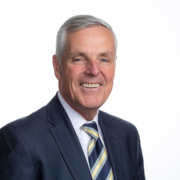 NYF
NYF
